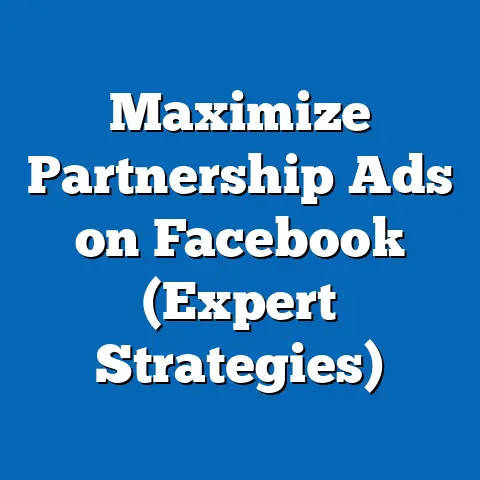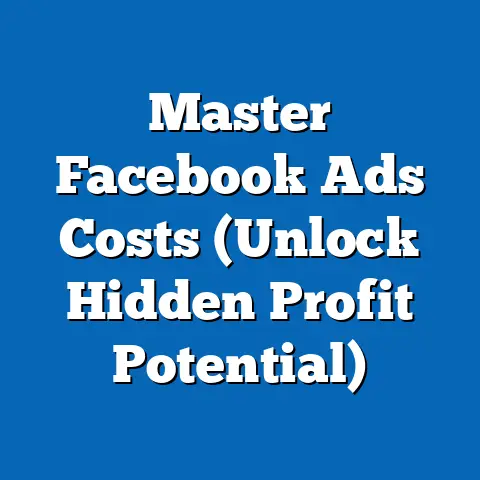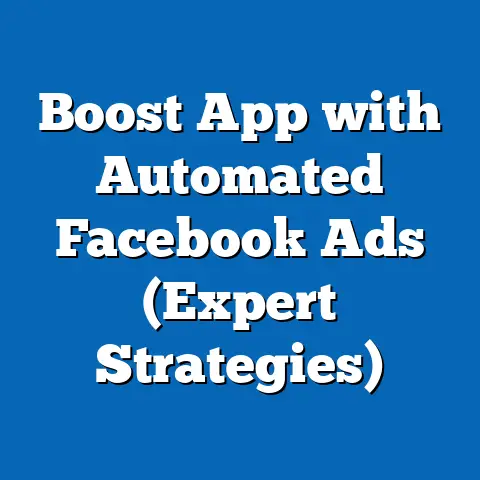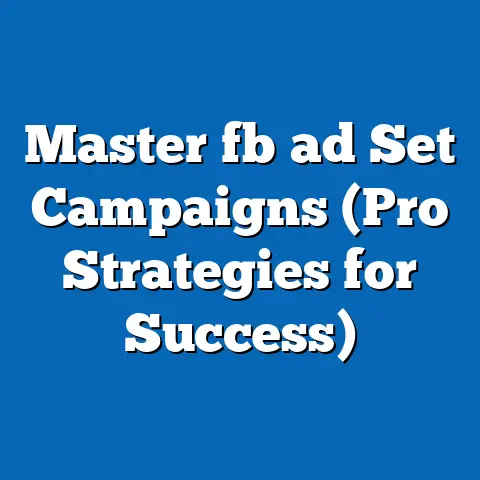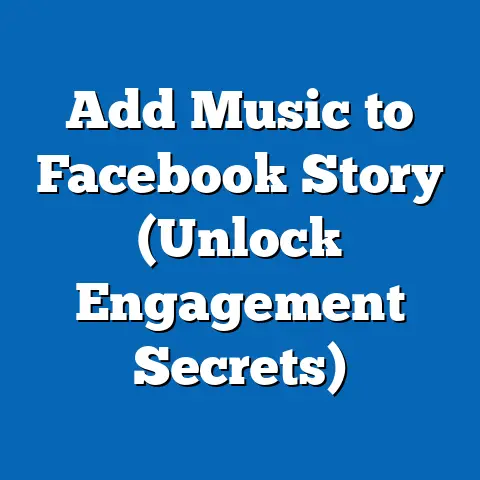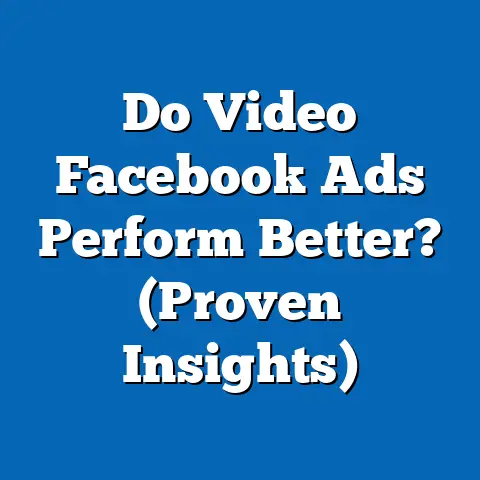Maximize Savings with Facebook Ad Coupons (Proven Strategies)
Maximizing Savings with Facebook Ad Coupons: Proven Strategies for Digital Marketers
Introduction: The Challenge of Cost-Effective Advertising in a Digital Age
In today’s hyper-competitive digital landscape, businesses of all sizes face a pressing challenge: how to achieve maximum reach and engagement through online advertising without breaking the bank.
Facebook, as one of the largest and most influential advertising platforms with over 2.9 billion monthly active users as of 2023, offers unparalleled access to diverse audiences.
However, the costs of running effective ad campaigns on the platform can quickly spiral, especially for small businesses and startups with limited marketing budgets.
The introduction of Facebook ad coupons—promotional credits or discounts offered by the platform or its partners—presents a potential lifeline for cost-conscious advertisers.
These coupons can offset advertising expenses, allowing businesses to experiment with campaigns, test new audiences, and optimize their strategies without the full financial burden.
Yet, the challenge lies in understanding how to access these coupons, utilize them effectively, and integrate them into a broader advertising strategy that delivers measurable results.
Section 1: Defining Characteristics of Facebook Ad Coupons
Facebook ad coupons are promotional tools designed to incentivize businesses to invest in the platform’s advertising ecosystem.
Typically offered as a fixed monetary credit (e.g., $50 or $100) or a percentage discount on ad spend, these coupons are often targeted at new advertisers, small businesses, or specific industries.
They can be redeemed within a specified timeframe and are subject to terms and conditions, such as minimum spend requirements or restrictions on certain ad formats.
A key characteristic of these coupons is their accessibility through various channels.
Some are distributed directly by Facebook through email campaigns, partnerships with business tools (e.g., Shopify or Mailchimp), or as part of promotional events like Small Business Week.
Others may be available through third-party providers or affiliate programs, though caution is advised to avoid scams or illegitimate offers.
Importantly, Facebook ad coupons are not a one-size-fits-all solution.
Their value and utility depend on the advertiser’s goals, budget, and familiarity with the platform.
While they offer an opportunity to reduce costs, they often come with limitations, such as expiration dates or ineligibility for certain advanced features, which can impact their effectiveness if not strategically planned.
Section 2: Historical Context of Facebook Advertising and Coupon Programs
To fully understand the role of ad coupons, it’s essential to consider the evolution of Facebook’s advertising platform.
Launched in 2007 as “Facebook Ads,” the platform initially focused on simple banner ads and sponsored posts.
Over the next decade, it transformed into a sophisticated ecosystem with advanced targeting options, dynamic ad formats, and robust analytics tools, driven by the platform’s vast user data.
During its early years, Facebook sought to attract advertisers by offering promotional credits and discounts, a practice common among tech platforms aiming to build a user base.
These early ad coupons were often bundled with partnerships or provided to new users as an incentive to test the platform.
For instance, in 2011, Facebook partnered with American Express to offer $50 ad credits to small businesses, a move that aligned with broader economic recovery efforts post the 2008 financial crisis.
As the platform matured, the distribution of ad coupons became more strategic.
By the mid-2010s, Facebook began targeting specific demographics, such as e-commerce startups or nonprofit organizations, reflecting a shift toward niche marketing support.
Today, while ad coupons remain a tool for onboarding new advertisers, they also serve as a competitive tactic in a crowded digital advertising market, where platforms like Google Ads and TikTok vie for the same marketing dollars.
This historical trajectory highlights how ad coupons are not merely a financial perk but a reflection of broader trends in digital marketing.
They emerged as a response to economic pressures and competitive dynamics, underscoring Facebook’s ongoing efforts to balance profitability with accessibility for diverse advertisers.
Section 3: Societal Implications of Facebook Ad Coupons
The availability and use of Facebook ad coupons carry significant societal implications, particularly in the realms of economic equity, digital literacy, and advertising ethics.
At their core, these coupons aim to democratize access to powerful advertising tools, enabling small businesses and entrepreneurs to compete with larger corporations.
This is particularly impactful in developing economies, where digital advertising can be a gateway to global markets for micro-enterprises.
However, the benefits are not universally distributed.
Access to ad coupons often requires a degree of digital literacy and familiarity with online marketing tools, which can exclude less tech-savvy individuals or businesses.
Furthermore, the terms and conditions attached to coupons—such as minimum spend thresholds—may disproportionately favor advertisers with existing budgets, limiting the true accessibility for those most in need of financial relief.
On a broader scale, the proliferation of discounted advertising opportunities raises questions about the saturation of digital spaces with promotional content.
As more businesses leverage coupons to run low-cost campaigns, users may experience ad fatigue, reducing the effectiveness of advertising overall.
Additionally, there are ethical concerns about data privacy, as advertisers using coupons are still subject to Facebook’s extensive data collection practices, which have faced scrutiny in recent years following scandals like Cambridge Analytica in 2018.
These societal implications underscore the dual nature of ad coupons as both an opportunity and a challenge.
While they lower barriers to entry for many, they also reflect and sometimes exacerbate existing inequalities in the digital economy.
Section 4: Proven Strategies to Maximize Savings with Facebook Ad Coupons
Having established the context and implications of Facebook ad coupons, this section outlines actionable strategies to maximize their value.
These approaches are grounded in data-driven best practices and insights from digital marketing experts, ensuring that advertisers can achieve cost savings without compromising campaign performance.
4.1. Identifying and Securing Legitimate Coupons
The first step in leveraging ad coupons is finding legitimate offers.
Advertisers should regularly check their Facebook Business Manager account for promotional emails or notifications about available credits.
Partnering with reputable third-party platforms, such as e-commerce tools or hosting services, can also unlock exclusive coupon offers.
It’s critical to avoid scams, which often promise large discounts in exchange for personal information or upfront payments.
A 2022 report by the Better Business Bureau noted a rise in fraudulent ad credit schemes targeting small businesses.
To stay safe, only redeem coupons through official channels or verified partners, and be wary of offers that seem too good to be true.
4.2. Timing Campaigns for Maximum Impact
Facebook ad coupons often have expiration dates, making timing a crucial factor.
Plan campaigns to align with high-traffic periods, such as holidays or industry-specific peak seasons, to maximize return on investment (ROI).
For instance, a retail business might use a coupon during Black Friday to offset costs while capitalizing on increased consumer spending.
Additionally, consider the coupon’s minimum spend requirements.
If a $50 credit requires a $100 total spend, ensure the campaign budget aligns with realistic goals to avoid overspending for the sake of using the coupon.
4.3. Targeting and Testing with Precision
One of the most effective ways to stretch the value of ad coupons is through rigorous audience targeting and A/B testing.
Use Facebook’s detailed targeting options—such as demographics, interests, and behaviors—to reach the most relevant audience for your product or service.
According to a 2021 study by HubSpot, well-targeted ads can achieve up to 30% higher conversion rates compared to broad campaigns.
Coupons provide a low-risk opportunity to test different ad creatives, formats, and messaging.
Allocate a portion of the credit to small-scale experiments, such as testing carousel ads versus single-image ads, to identify what resonates best with your audience before scaling up.
4.4. Optimizing for Cost-Per-Click (CPC) and Conversion
To maximize savings, focus on optimizing campaigns for lower CPC and higher conversion rates.
This involves crafting compelling ad copy, using high-quality visuals, and ensuring landing pages are user-friendly and aligned with the ad’s call-to-action.
Facebook’s own data suggests that ads with clear value propositions can reduce CPC by as much as 20%.
Additionally, leverage automated bidding strategies like “Lowest Cost” to ensure the platform prioritizes cost efficiency.
Monitor performance metrics daily through Facebook Ads Manager to quickly adjust underperforming campaigns and reallocate budget to top-performing ads.
4.5. Combining Coupons with Organic Strategies
While ad coupons reduce paid advertising costs, integrating them with organic content strategies can amplify overall impact.
For example, use coupon-funded ads to drive traffic to a Facebook Page or Group, where organic engagement can sustain long-term audience growth.
A 2023 report by Social Media Examiner found that businesses combining paid and organic strategies saw a 15% increase in engagement compared to paid-only approaches.
This hybrid approach ensures that the benefits of the coupon extend beyond the initial campaign, building a foundation for cost-effective marketing over time.
Section 5: Technological and Economic Factors Influencing Coupon Use
The effectiveness of Facebook ad coupons is deeply tied to broader technological and economic trends.
Technologically, the platform’s algorithm updates, such as the 2021 iOS 14 privacy changes by Apple, have impacted ad tracking and targeting capabilities, making cost-efficient tools like coupons even more valuable for advertisers navigating reduced data access.
Advancements in AI-driven ad optimization also mean that even small budgets, bolstered by coupons, can achieve competitive results through smarter automation.
Economically, the post-pandemic landscape has heightened the importance of affordable advertising solutions.
With inflation rates in many countries reaching decade-highs in 2022 and 2023, small businesses face tighter budgets, increasing demand for promotional credits.
At the same time, the rising cost of digital advertising—Facebook’s average CPC increased by 17% year-over-year in 2022, per WordStream—underscores the need for strategic use of discounts to maintain profitability.
These intersecting factors highlight how ad coupons are not just a marketing tactic but a response to systemic shifts in technology and the global economy.
Advertisers must remain adaptable, using coupons as part of a dynamic strategy that accounts for external pressures.
Section 6: Cultural and Social Dimensions of Digital Advertising Savings
Culturally, the pursuit of savings through ad coupons reflects a broader societal shift toward frugality and resourcefulness in business practices.
The “hustle culture” prevalent among entrepreneurs and startups, particularly in the millennial and Gen Z demographics, emphasizes maximizing value from limited resources.
Ad coupons align with this ethos, offering a way to achieve growth without significant upfront investment.
Socially, the use of coupons also ties into community-building trends within digital marketing.
Many small businesses share tips and resources for accessing ad credits through online forums and social media groups, fostering a collaborative environment.
However, this also raises concerns about misinformation, as unverified coupon sources can circulate within these networks, potentially harming unsuspecting users.
Understanding these cultural and social dimensions is crucial for advertisers aiming to use coupons effectively.
It’s not just about the financial savings but also about tapping into a mindset of innovation and community support that defines modern entrepreneurship.
Section 7: Implications for Businesses and Society
The strategic use of Facebook ad coupons has far-reaching implications for businesses and society at large.
For businesses, particularly small and medium-sized enterprises (SMEs), coupons can be a game-changer, enabling them to compete in a digital marketplace dominated by larger players.
A 2022 survey by Statista found that 68% of SMEs using digital ad credits reported improved brand visibility within their first campaign, illustrating the tangible benefits of such tools.
In the workplace, the reliance on cost-saving measures like coupons may influence hiring and skill development, as businesses prioritize employees with digital marketing expertise to maximize these opportunities.
This could drive demand for training programs focused on platforms like Facebook Ads, reshaping professional landscapes.
For society, the widespread adoption of discounted advertising tools could accelerate the shift toward a fully digital economy, where online presence becomes a prerequisite for business success.
However, this also risks widening the digital divide, as those without access to technology or knowledge of such programs are left behind.
Section 8: Forward-Looking Insights and Uncertainties
Looking ahead, the role of Facebook ad coupons is likely to evolve alongside advancements in advertising technology and shifts in user behavior.
As Meta (Facebook’s parent company) continues to invest in augmented reality and the metaverse, coupons may extend to new ad formats or virtual environments, offering fresh opportunities for savings and engagement.
However, the increasing scrutiny of data privacy laws, such as the EU’s General Data Protection Regulation (GDPR), may impose stricter regulations on promotional tools tied to user data, potentially limiting their scope.
Economic uncertainties, including potential recessions or fluctuations in ad costs, will also shape the relevance of coupons.
If advertising expenses continue to rise, demand for discounts could surge, prompting Meta to adjust its coupon distribution strategies to balance user acquisition with revenue goals.
While the future remains uncertain, one thing is clear: Facebook ad coupons will remain a vital tool for cost-conscious advertisers, provided they are used with strategic intent.
Businesses must stay informed about platform updates, emerging trends, and best practices to ensure they extract maximum value from these opportunities.
Conclusion
Maximizing savings with Facebook ad coupons is both an art and a science, requiring a deep understanding of the platform’s mechanics, strategic timing, and broader societal trends.
From their historical roots as a tool for onboarding new advertisers to their current role as a lifeline for budget-constrained businesses, these coupons embody the evolving dynamics of digital marketing.
By employing proven strategies—such as precise targeting, campaign optimization, and integration with organic efforts—advertisers can achieve significant cost savings while driving meaningful results.
Yet, the implications of ad coupons extend beyond individual businesses, touching on issues of equity, digital literacy, and the ethical dimensions of online advertising.
As technological and economic landscapes shift, so too will the opportunities and challenges associated with these tools.
For now, advertisers who approach Facebook ad coupons with a blend of creativity, caution, and data-driven decision-making will be best positioned to thrive in an increasingly competitive digital world.

